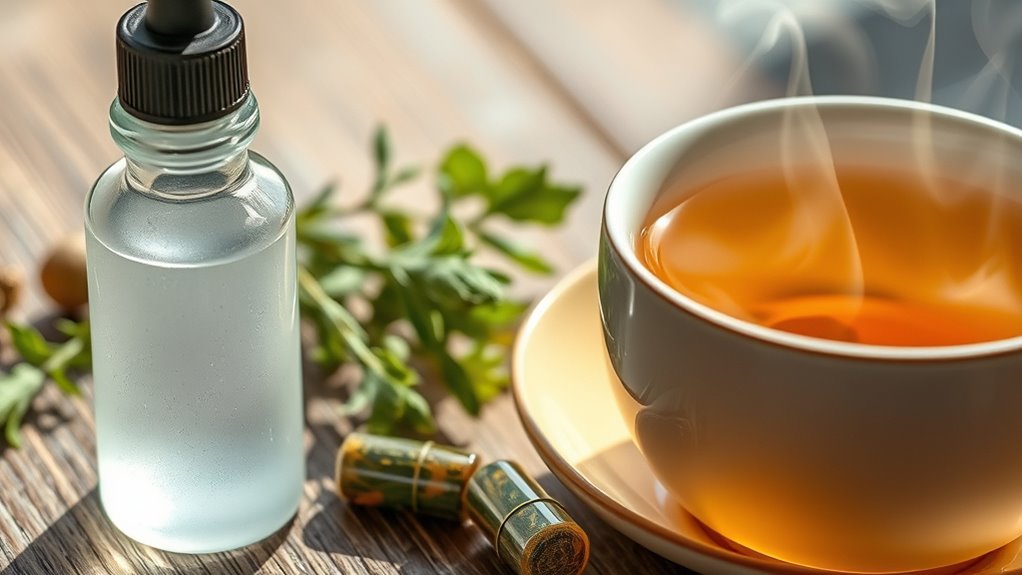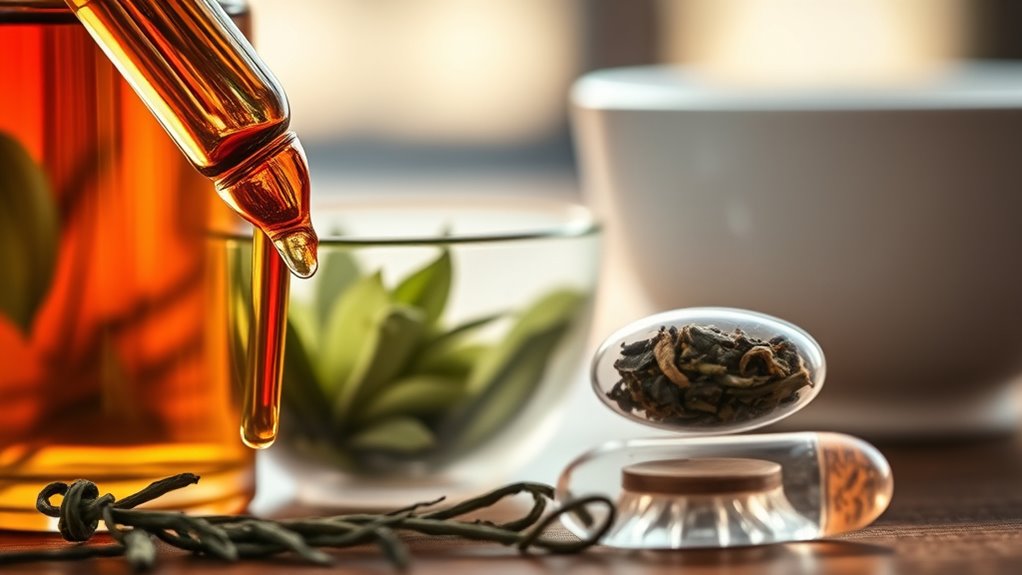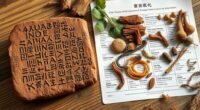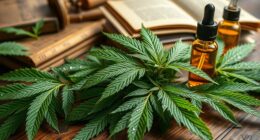Choosing between tinctures, teas, or capsules depends on your needs. Tinctures offer quick absorption, precise dosing, and convenience, making them ideal if you want fast results. Teas are gentle and traditional but can vary in strength and take time to prepare. Capsules provide reliable doses and portability, perfect for busy schedules. To understand which suits your lifestyle best, explore the detailed pros and cons of each herbal prep option.
Key Takeaways
- Tinctures offer quick absorption, precise dosing, and broad-spectrum extraction, making them ideal for fast and reliable results.
- Teas provide a traditional, gentle approach but have variable potency and slower, less consistent effects.
- Capsules are convenient, portable, and ensure accurate dosage but depend on digestion for absorption.
- Tinctures require minimal preparation and are easy to use on-the-go, unlike teas which need brewing time.
- Personal preference and specific health needs determine whether tinctures, teas, or capsules are the best herbal choice.

When choosing an herbal preparation, understanding the differences between tinctures, teas, and capsules can help you make the best choice for your health needs. Each method involves distinct herbal extraction methods, which influence not only how the active compounds are released but also how dependable your dosage is. Tinctures are made by soaking herbs in alcohol or a mixture of alcohol and water, which extracts the plant’s active constituents efficiently. This extraction process tends to be quick and thorough, capturing a broad spectrum of herbal compounds. Because of this, tinctures often offer better dosage consistency, allowing you to take precise amounts with minimal variation. If you prefer a highly controlled dose and fast absorption, tinctures are a solid option.
Teas, on the other hand, involve steeping dried herbs in hot water. This traditional method relies on heat to extract certain water-soluble compounds, but it’s less efficient at drawing out all active ingredients compared to tinctures. The herbal extraction methods used in teas can vary considerably depending on brewing time, water temperature, and herb quality, which makes dosage less predictable. If you like a gentle, ritualistic approach and don’t mind variability, teas can be a soothing choice. However, because herbal extraction through steeping isn’t as precise, the potency of each cup may fluctuate, making it harder to control exactly how much of the herb’s benefits you’re getting each time.
Capsules contain powdered herbs, which are usually made from dried, ground plant material. These capsules preserve the herbal compounds through encapsulation, but the herbal extraction methods involved happen before encapsulation, often through processes like cold extraction or drying. Capsules provide a convenient way to consume herbs without taste or preparation fuss. They also tend to offer good dosage consistency because each capsule contains a specific amount of herb, making it easier to track your intake. However, the release of active compounds depends on how quickly your digestive system dissolves the capsule, which can vary between individuals. If you want a simple, portable option with reliable dosing, capsules are a practical choice.
Frequently Asked Questions
Are Herbal Preparations Safe During Pregnancy or Breastfeeding?
When considering herbal preparations during pregnancy or breastfeeding, you should prioritize herbal safety and pregnancy precautions. Not all herbs are safe, and some can cause complications or affect milk production. Always consult your healthcare provider before using any herbal products. They can guide you on safe options and proper dosages, ensuring you avoid potential risks. Remember, cautious use is essential to protect both you and your baby.
How Do Herbal Preparations Interact With Prescription Medications?
Herbal preparations can interact with your prescription medications, so it’s important to be cautious. These herbal drug interactions may affect how your meds work or increase side effects. Always consult your healthcare provider before combining herbs with prescriptions, and follow dosage considerations carefully. Monitoring both your herbal and medication intake helps prevent adverse effects and ensures safe, effective treatment. Never underestimate the importance of professional guidance when mixing herbal remedies with prescribed drugs.
Can Herbal Remedies Cause Allergic Reactions or Side Effects?
Herbal remedies can sometimes cause allergic reactions or side effects, and you should take them seriously—they’re not harmless magic. You might experience symptoms like skin rashes, stomach upset, or even more severe reactions. Always start with a small dose and consult a healthcare professional, especially if you’re taking other medications. Being cautious helps prevent unexpected allergic reactions and side effects that could turn your wellness journey into a nightmare.
What Is the Shelf Life of Herbal Tinctures, Teas, and Capsules?
You wonder about the shelf life of herbal preparations. Generally, proper storage duration varies: tinctures last 2-5 years if kept in a cool, dark place, while teas are best within 6-12 months to maintain freshness. Capsules typically stay effective for 1-3 years. To guarantee freshness maintenance, always check expiration dates and store your herbal remedies properly, avoiding heat, light, and moisture.
Are Herbal Preparations Regulated or Standardized for Potency?
You might wonder if herbal preparations are regulated or standardized for potency. The reality is, standardization challenges exist due to natural variability, making potency inconsistent across products. While some manufacturers attempt to address this by testing and labeling active ingredients, many products still face potency variability. This means you should choose trusted brands and read labels carefully, understanding that herbal potency can differ from batch to batch.
Conclusion
Choosing between tinctures, teas, or capsules is like selecting your own adventure—each offers unique benefits and drawbacks. Think of tinctures as a swift arrow, delivering herbs quickly; teas as a calming stream, soothing with warmth; and capsules as sturdy bridges, offering convenience. Your choice depends on your needs and preferences. Weigh these options carefully, and you’ll find the herbal path that best guides you toward wellness—your journey, your destination.










